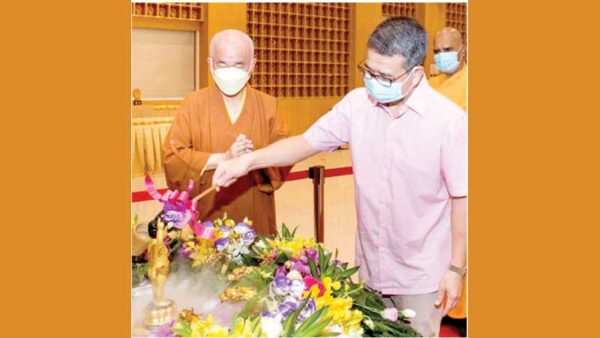
Singapore Minister for Culture, Community and Youth Edwin Tong performing the ritual of bathing Prince Siddhartha during a visit to the Singapore Buddhist Federation on Sunday. With him is the Venerable Kwang Phing, President of the Federation.
Source:Dailynews
This marks the second year that Buddhists around the world will celebrate Vesak, a holiday commemorating the Buddha’s birth, enlightenment, and final passing into parinirvana, under the confines of pandemic life. Similar to Vesak 2020, many countries and Buddhist temples have opted for scaled-down or online versions of the traditional events, which include prayer, chanting, the lighting of candles and paper lanterns, and the offering of gifts.
In Thailand, where the Buddha’s birthday, or ‘Visakha Bucha Day’, falls today, religious activities will follow strict Covid-19 preventative measures, according to the Bangkok Post. Thailand’s Minister of Culture, Ittipol Khunplome, has encouraged Buddhists to celebrate Visakha Bucha Day via online ceremonies hosted by the Department of Religious Affairs and a network of Buddhist leaders from May 20 to 26.
 Culture Minister Ittipol Khunplome has revealed that the resurgence of Covid-19 has again put a limit on Visakha Bucha Day religious activities, hosted annually by the Department of Religious Affairs (DRA) in cooperation with the clergy and other public and private businesses.
Culture Minister Ittipol Khunplome has revealed that the resurgence of Covid-19 has again put a limit on Visakha Bucha Day religious activities, hosted annually by the Department of Religious Affairs (DRA) in cooperation with the clergy and other public and private businesses.
To help flatten the curve of the contagion, this year’s activities today (26) will now strictly follow preventive measures from the Ministry of Public Health. Buddhists are thereby encouraged to participate in Visakha Bucha Day 2021 ‘new normally’ via online platforms.
The Minister also addressed the ongoing cooperation between the DRA and a network of clergy to host online activities from May 20 to 26 to promote understanding of the essence of Buddhism. Religious practices, such as making offerings to the Buddha, will be broadcast live on the NBT channel from Wat Phra Chetuphon Vimolmangklararm today (26) from 8.30 pm to 9.00 pm, along with the chanting of Buddhist mantras and traditional candle-lit temple walks.
Organisers have put together an online exhibition of the Buddha’s life. Thus Buddhists at home can still join Visakha Bucha Day celebrations through the Stay Home, Make Merit app. Essential doctrines, insights and sermons from several monks of repute are also featured on the platform. Visitors can write down their resolutions to perform good deeds using the Buddha’s teachings as guidance. Candle-lit temple walks can be safely joined online. To support the continued promotion of Buddhism, a Visakha Bucha Day E-Booklet is available at no cost on the Stay Home, Make Merit app, DRA’s Facebook page, and www.dra.co.th.
South Korea’s Buddhist community adhered to Covid-19 precautions when it celebrated the Buddha’s birthday on May 19, Yonhap News Agency reported. President Moon Jae-in expressed his gratitude to the Buddhist community for deciding to cancel the annual lotus lantern festival, Yeon Deung Hoe, a decision made more difficult due to the festival’s recent listing as a UNESCO event of Intangible Cultural Heritage. “It’s natural wanting to celebrate the feat, but the Buddhist community decided to cancel this year’s lantern festival and hold an online event instead,” President Moon said in a message shared on social media.
 Although South Korean Buddhists could not gather in Seoul for the festival, they will be able to visit a rare Buddha for the first time. A giant scroll painting of Rocana Buddha travelled from its permanent home at the Sinwon Temple in South Chungcheong to be displayed at the National Museum of Korea in central Seoul, just in time for the Buddha’s birthday. According to Korea JoongAng Daily, the gigantic 17th-century painting (32.8 feet high and 21 feet wide) – and Korea’s National Treasure No. 299 – will be on display until September 26.
Although South Korean Buddhists could not gather in Seoul for the festival, they will be able to visit a rare Buddha for the first time. A giant scroll painting of Rocana Buddha travelled from its permanent home at the Sinwon Temple in South Chungcheong to be displayed at the National Museum of Korea in central Seoul, just in time for the Buddha’s birthday. According to Korea JoongAng Daily, the gigantic 17th-century painting (32.8 feet high and 21 feet wide) – and Korea’s National Treasure No. 299 – will be on display until September 26.
In a white paper titled “Tibet Since 1951: Liberation, Development and Prosperity,” released on Friday, the Chinese government said it must approve any successor to the Dalai Lama – and that Tibet has been a part of China for centuries, India’s Economic Times reports. When the current Dalai Lama, the 14th generation of a lineage that dates back to 1642, dies, regents – typically the Dalai Lama’s disciples – will begin searching for his reincarnation, following the guidance of oracles and omens from religious leaders. As the Dalai Lama ages (he is currently 85 years old), the subject of his successor has become particularly pressing.
The Tergar Meditation Community, founded by the respected Dharma teacher and master of the Karma Kagyu and Nyingma lineages of Tibetan Buddhism Yongey Mingyur Rinpoche, has announced a special online Saga Dawa community celebration to be led by Rinpoche on May 29.
Saga Dawa (Skt: Vaishakha), the fourth month in the Tibetan lunar calendar, is the most important Buddhist religious and cultural event of the year. The name is derived from the clan name of Shakyamuni Buddha. The occasion is also known in Tibetan as Bumgyur Dawa, “the 100,000-multiplying month,” as karma from all skillful and unskillful actions is believed to be multiplied 100,000 times. This year, Saga Dawa runs from May12 to June 10, with Saga Dawa Duchen, the single most important day of the year for Tibetan Buddhists, commemorating the birth, enlightenment, and final passing into parinirvana of Shakyamuni Buddha, falling on May 26, the full moon day. The occasion is also known around the world as Buddha Purnima and Vesak in other Buddhist traditions and following different calendars. The event is open to all, with translations offered in Chinese, French, German, Portuguese, Russian and Spanish.
In Fukui, Japan, a priest has revived attendance at his small temple by giving his services a modern twist: techno music and light shows. Though he was passionate about DJing in his youth, Gyosen Asakura eventually followed in his family’s footsteps and became a 17th-generation priest. Now, he’s found a way to combine his love for music with his religious life. “The main teaching of Buddhism is nothing will remain. Everything will change. So, I thought the traditional way of teaching must change as well,” Asakura told the Indianapolis-based TV station WTHR. “Traditionally, the temple would try to recreate the world of light with gold decorations. So, the traditional music can change. Suiting the music to the modern generation.”
Prayers and support for India
On Wednesday, India reported 4,529 deaths from Covid-19 in 24 hours – a new global high as the country’s second wave continues to rage. However, as the New York Times has reported, this number doesn’t even represent the real toll because so many cases and fatalities don’t get reported. In response to the surge, neighboring Bhutan has pledged Buddhist prayers and liquid oxygen to India. On May 12, the Zhung Dratshang, Bhutan’s central Buddhist monastic body, offered 1,000 butter lamps and prayers to Covid victims, specifically those in India.
 On May 15, King Jigme Khesar Namgyel Wangchuck visited the oxygen plant that will supply 40 metric tons of liquid oxygen per day to Assam. Meanwhile, the Sri Lanka Broadcasting Corporation started airing the Ratana Sutta, known as the ‘Jewel Discourse’, to bless India’s Covid victims last week. Though the Sutta has been airing since October 2020, SLBC Director General Chandrapala Liyanage said last week that they have entered a second phase of the programme in partnership with the Indian High Commission in Colombo. “We have extremely strong ties with India, and Buddhism came to Sri Lanka from India. That is specifically the reason why we decided to air the chantings for India,” Liyanage said.
On May 15, King Jigme Khesar Namgyel Wangchuck visited the oxygen plant that will supply 40 metric tons of liquid oxygen per day to Assam. Meanwhile, the Sri Lanka Broadcasting Corporation started airing the Ratana Sutta, known as the ‘Jewel Discourse’, to bless India’s Covid victims last week. Though the Sutta has been airing since October 2020, SLBC Director General Chandrapala Liyanage said last week that they have entered a second phase of the programme in partnership with the Indian High Commission in Colombo. “We have extremely strong ties with India, and Buddhism came to Sri Lanka from India. That is specifically the reason why we decided to air the chantings for India,” Liyanage said.
With the ongoing Covid-19 pandemic, activities for Vesak Day, which falls today (26), will again have to be scaled down and moved online.
Prior to the pandemic, the day of celebration for Buddhists would see many flock to temples, engaging in a day of prayers and offerings.
Last year, Singapore was in its circuit breaker period on Vesak Day, which became a muted affair.
In the light of safe distancing measures again this year, the Singapore Buddhist Federation has put together a livestream for devotees so they can view the prayers and activities remotely today.
Minister for Culture, Community and Youth Edwin Tong visited the Federation at its premises in Geylang on Sunday.
In a Facebook post, he said he had visited to explain the current situation to the Federation and to thank them for their understanding and leadership.
“A regular Vesak Day would usually see thousands of Buddhists visit the temples, engaged in a day of prayers and offerings, performing Three Step One Bow procession, Light Transference ceremony, and the bathing of Prince Siddhartha. This year, however, these activities will again have to be scaled down and also moved online,” he said.
“I know many people seek solace in religion, and I hope that we will be able to overcome this recent spate of infections, and resume some degree of community events again. Venerable Seck Kwang Phing, President of the Singapore Buddhist Federation, showed me their livestream set-up, which was put together by their millennial generation. Devotees can now view livestreams of the prayers and activities, or watch and pray with the recorded prayers services at their convenience,” he said.
Those who wish to view the streams may register via the Federation’s page on Facebook or through its website.
The Embassy of India in Phnom Penh, in collaboration with Preah Sihanouk Raja Buddhist University (SBU), hosted a webinar discussion on Sunday, about Buddhism in Cambodia and Southeast Asia to celebrate Vesak Day and the 130th anniversary of the birth of Dr. B.R. Ambedkar, considered the chief architect of the Constitution of India. During the webinar, Ambassador of India to Cambodia Dr. Devyani Khobragade stressed the importance of Vesak Day for the Buddhist community all over the world.
“The United Nations at the 54th session of UN General Assembly in 1999 had recognised Vesak as an International Day of Observance. The teachings of Buddha have brought people together across social, generational, cultural and national divides especially in these challenging times of the Covid-19 pandemic,” she said.
She highlighted the ancient connections between India and Cambodia and India’s efforts to take its relationship with Southeast Asian countries, including Cambodia, to new heights through Buddhist linkages.
“As heirs to these ancient civilisations and religion, our countries have a lot to offer to the rest of the world in the form of culture and learning,” she added.
Dr. Khobragade also outlined some of the initiatives that the Indian government has been undertaking, such as working on the Buddhist circuit, organising international Buddhist conferences, offering scholarships to Cambodian students and monks in Nalanda University on Buddhist Studies as well as organising online ITEC courses on Buddhism and Vipassana and more. She highlighted India’s resolve to continue fostering strong Buddhist linkages between India and Buddhist countries through various bilateral, multilateral and public and private initiatives. (Tricycle, Agencies)






